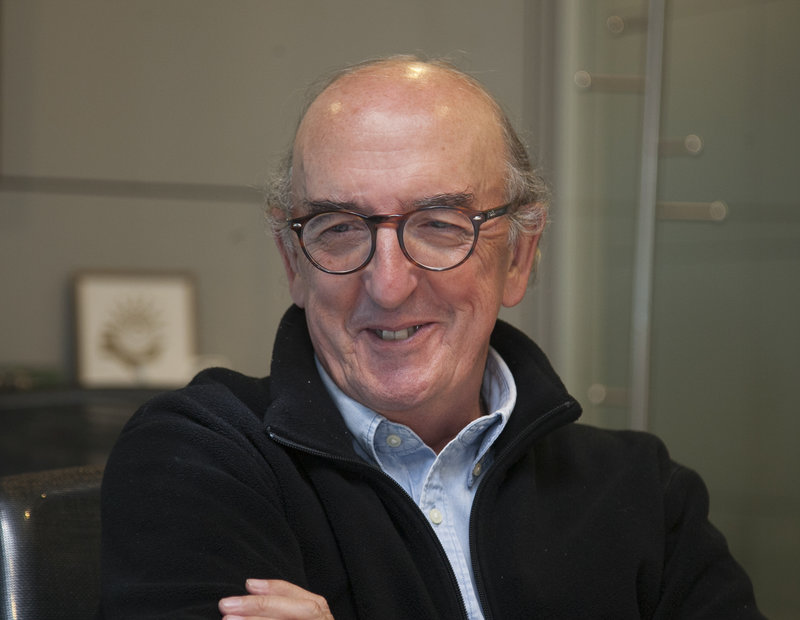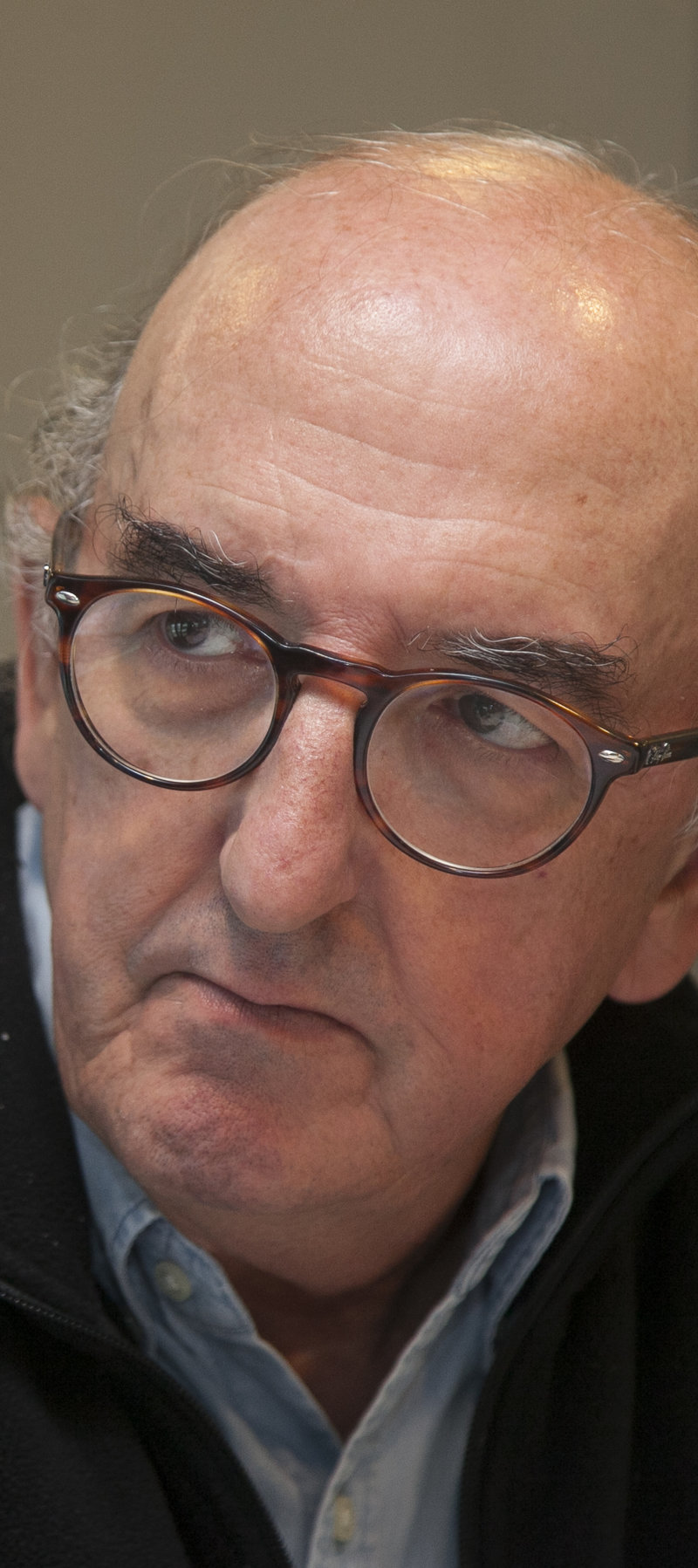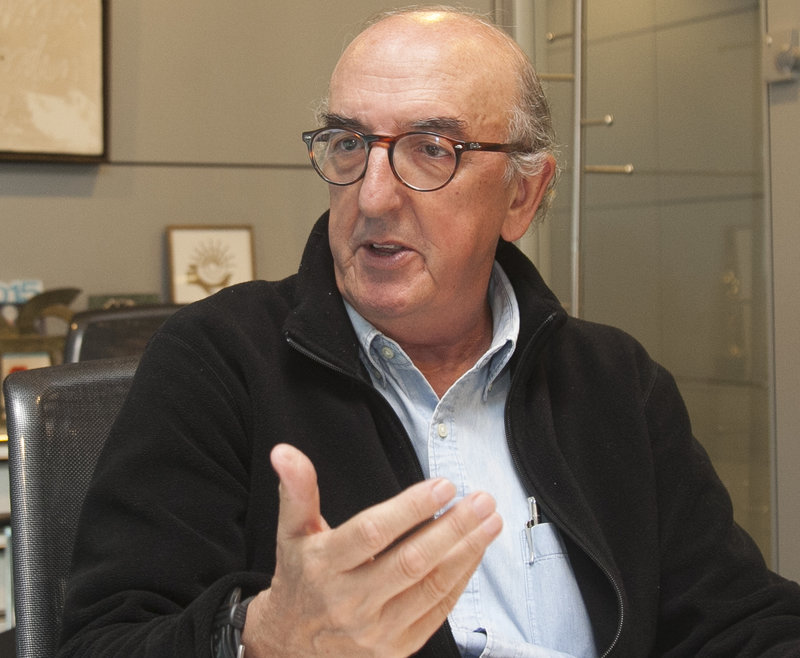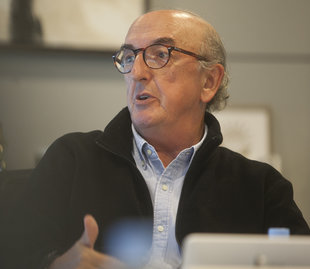Jaume Roures
REPUBLICAN OF THE YEAR AWARD Readers and subscribers of La Republica voted to acknowledge the producer’s professional and personal career
Readers of La República have voted Jaume Roures Republican of the Year, the film producer pipping cook Ada Parellada and football coach Pep Guardiola to the award. His pro-referendum stance and defence of political prisoners, but as a non-independence supporter, make him a much listened to voice in circles that extend well beyond the pro-sovereignty and even republican spheres. Responsible as either director or producer for the documentaries Les clavegueres d’Interior (The Sewers of the Interior Ministry) and those dedicated to the events of 1-O and 20-S, Roures has offered a counterpoint to the official history being imposed by the four powers of the Spanish state. From his Mediapro watchtower, Roures has been and continues to be one of the central characters in the evolution of the media landscape in relation to Europe. However, our conversation focuses mainly on these delicate political times in Catalonia.
Your documentary Les clavegueres d’Interior was first shown in May 2017. In hindsight, it only revealed a little of the quagmire. Was that also your perception when you made the documentary?
We had many perceptions, but we only had the evidence we showed, because if you don’t want to lose credibility from a journalistic point of view, you can only base your work on what you have. We showed what we had that was corroborated by the police. Because, let’s not kid ourselves, what gives this documentary its power are the statements by the police. We’re now working on the second part, investigating who financed everything beyond the money from the Ministry of the Interior. In initial conversations, we’ve already seen that large private companies are involved, and we’re now working on this issue.
How is it possible to build up a para-official espionage network of such magnitude?
The theme of state sewers is not one we’ve just discovered, but has been recurrent throughout this century and before. The theme exists and I don’t want to say that it will continue to exist because I still trust in humanity, but it exists, also because from the outside it is understood that we already know things happen that mean the state has to have sewers. Politicians, judges and even journalists think this. To put it bluntly, many see the case of Villarejo as being necessary. That is, they punish him but in the end he is part of dirty wars that are ultimately necessary. There are people who argue that there is no state if there are no sewers. That’s the worst thing about it.
If that’s the dominant view, how can a state be made without sewers?
Well, the democratic, police and judicial mechanisms must serve to fight them. But the situation is that in general, society accepts that sewers must exist. After our documentary, they either had to throw us or them in jail. But nothing has happened, and Villarejo even turns out to be a nice guy.
Before there was this hypocrisy, at least in public opinion, of accepting that the sewers existed but were kept quiet. But today there’s a scandal and everything stays the same. What has to change to make people react?
I think that it’s the result of a long lack of a democratic culture. After the dictatorship, not only are there certain apparatuses of the state that have not been touched, but also the understanding that people have about what freedoms and democracy are is very limited. This is the problem, and we see it now with the Catalan issue. We tried to show the documentary about 1-O in Madrid and the man from the PP there comes out and says that it shouldn’t be shown. The same happened with Julio Medem and La pelota Vasca. Before it premiered it had already been condemned, because it gave a voice to all parties in the conflict. This should not happen in a democracy. Someone can release their documentary and the man from the PP who doesn’t like it should have to show the footage from cameras on the police helmets and try to show that the police were the ones being attacked by our grandparents and our children.
Why are there no documentaries that show the opposite to yours?
Because they can’t exist. It’s like the one on September 20. I find it hilarious that they tell me that the ones we make are “biased”. I don’t know who they’re biased towards, but then why don’t they do the same? Because it’s about stopping ours from being seen. And here, beyond the political stance, it’s about censorship. It’s not about confronting and discussing, the point is that you do not hear different opinions. This is a very serious issue.
But isn’t censoring a documentary that can be uploaded to YouTube a little like twentieth-century thinking?
Yes, but in the end they get away with it. It’s not the same seeing it at home on YouTube and talking to your family about it as making it possible to broadcast it on television, where it will have greater repercussions. There is freedom of expression, but you don’t have a microphone, which means that freedom of expression is very limited. Look at the scandal with the programme Informe Semanal and Junqueras. We previously made a series called Philosophy in prison, and we went to prison and met prisoners and they talked to the camera! And it’s always been possible to speak with prisoners! In this case, the criticism is “How can you think about giving a voice to someone in prison?” Well we always have. What do they want? They don’t want this voice to be heard.
The level of tolerance in Spain with phenomena such as sewers or censorship doesn’t seem to be applicable to Catalonia. Are there differences between Spanish and Catalan public opinion?
Well, here we’ve had the so-called Catalan Oasis, and 3% and lots of other scandals...
Yes, but those scandals have led to the most responsible party disappearing off the scene, for example.
What I mean is that we’re not that much more open and more democratic than those in Spain. Yes, it is true that here there has been an evolution that makes us focus on things more openly.
Even though it touches on other subjects, the documentary Les clavegueres d’Interior was very much focused on Catalonia. Now we see that no one comes out unscathed. Is there anyone who can feel safe in Spain?
Nobody can feel safe, but not just here, anywhere in the world. Unfortunately, the sewers have now opened up and now everything is done openly, with evidence being invented as necessary. We have made a qualitative leap downwards and the whole state apparatus defends these positions by appealing to judicial independence when if justice were independent, they wouldn’t have done everything they’ve done up to now. It’s obvious that they [the judges] are either being guided politically by the government or the party that was in government, or imposing their own political and ideological beliefs on legal reality. Now we’re making a documentary about the judges, and what do we find? If you remember the documentary on 20-S, the former constitutional court lawyer Joaquín Urías said that of 250 law professors, 240 say that the accusations do not hold up. We went to look for all of them. But even those who say that this is all nonsense add: “But, well, you know what these guys are like...” Why? Firstly, because there is this huge ideological and political weight, and secondly, because the pressure is unsustainable, and we need to be aware of this. The pressure on the Spanish people regarding the Catalan issue means that those who sympathise with us, whether democrats, or those that think we should have the right to vote or that the repression on 1-O was barbaric, do not dare to express it. If you express it everyone will jump on you, and that’s really messed up.
Is that what can carry weight when reconsidering some positions of the powers of the state regarding the judicial process?
I think the judgment is already made. It’s just a matter of passing sentence. The point is that even if the PSOE wanted to do something about it, the pressure being exerted by the PP, C’s and now Vox is suffocating. The day Minister Celaá came out and revived the idea of the images from October 1 being false, why do that? Because they have to prove they’re not on the other side. We have to be aware of these things.
Is the issue of the prisoners and judicial consequences the basic obstacle to a degree of detente?
Absolutely. But what’s also happening is that the greater the problems are, the more capacity is required to face them. In this respect, the prisoners cannot become the excuse, because what matters is to see what concrete actions we are able to implement to resolve the problem of the prisoners, either before, during or after the trial. I don’t understand why people say that at least there will be a government until the sentence. How does that help? What future are you painting? You’re limiting yourself with a date. What does it mean that if there is a harsh sentence you’ll call elections? Don’t say it now, because we’ll have to see at the time and on the basis of fifty thousand different factors. Because, in addition, I think it is then that we should go out onto the streets en masse, because there will be international attention and we’ll have to demonstrate that we don’t accept the pantomime trial. But what happens if people don’t come out? Then it means that you don’t have enough strength to call elections and come out of it looking better than you do now. Because let’s be honest and acknowledge that although 21-D was a great victory within the framework that existed, it is quite unrepeatable, because, for example, it would be very difficult to get that same turnout again. Therefore, before pointing to the future you have to analyse the specific situation.
Was Soraya Sáenz de Santamaría more right than it first appeared when she said that she had decapitated the pro-independence movement?
Yes, but apart from making Soraya and her plan responsible, that also means we’re very weak, if with ten fewer people there is no clarity, even though these people send messages every day. I believe that political responsibility in the face of society involves a level of moral authority that does not exist anymore. Beyond Puigdemont, beyond Junqueras, this moral authority does not exist, the one that would give the leaders the capacity to mark the line beyond their theoretical positions. Now they look like a bunch of headless chickens, often saying completely contradictory things. Because we are a serene people we put up with it all, and I don’t think that, despite this confusion, people will be demobilised. But if this situation gets any worse we will eventually have demobilisation.
Has the change of government in Madrid changed anything or does this pressure that you mentioned, this surveillance the PSOE is subject to, make progress impossible?
The change of government opens up some doors that were not open before. We must approach these doors intelligently, making little noise, and negotiate things and negotiate them seriously, and also negotiate things we can negotiate on and deliver political outcomes for. Because, what is more, they do not have any. Pedro Sánchez came here as a replacement, even within his own party. Political intelligence also depends on giving Sánchez ways out, not ultimatums. This is a slow process, and when I say slow or discreet I don’t mean: “Well, let’s see what happens”, but rather concrete proposals need to be taken beyond the referendum problem. We have to get back the laws that were taken away by the constitutional court, the PP’s labour laws can be done away with, the gagging law... In all of this, we must be the main drivers, because then we will also teach the Spanish that we also want to build a better society. It’s not that the Catalans are better looking, but rather that we have a plan for our country, where it functions in a certain way socially. What is in theory more advanced here, at least in the legislative sphere, is what we have to teach them. We will not win majorities here or a certain degree of complicity there if we are not capable of doing that. What is Spain’s problem? Spain’s problem is that it has no plan.
Spain doesn’t have a plan for Catalonia or for itself?
It doesn’t have one for Spain! How do I understand governance? It’s not just about defending the general interest, but rather telling people “We’re going in this direction” and our plan for 2025 or 2030 is to have A, B, C and D. That doesn’t exist in Spain, it’s a country that takes one day at a time. I’m not pro-independence, but I recognise that at least the pro-independence movement has built a narrative and said that the goal is not only independence, but certain elements that form part of that. This is what drags people away. People haven’t seen the light from one day to the next, rather there’s a plan. But we must also bear in mind that people cannot be mobilized indefinitely. When you crash against the wall, and that’s the first issue that needs to be acknowledged, you have to look at how to rebuild the situation. You can’t think nothing’s happened here and people will continue to come out every time they’re called to.
And finally, as a professional in the world of communication, what advice would give the reader in a world of too much information?
That so much information actually allows us is access to many things. So you have to read many different things, trust in few and create some sort of criteria. Although Twitter and the social networks are doing a lot of damage. Therefore, read a lot and be thoughtful and selective.
interview
interview
The success of constant struggle The documentary as a tool
Jaume Roures i Llop (Barcelona, 1950) views the world from the great platform of Mediapro, which he founded in 1994, and Imagina Media Audiovisual. Known to the public as a producer of Woody Allen films and as the figure who controls the television rights for major sports, he started his professional career with TV3. From 1983 onwards, he was the head of the news department, and from 1986, head of sports productions, where he met his main business partner, Tatxo Benet. In addition to the Mediapro empire (whose main stakeholder has been a Chinese group for a few months now) he has promoted, among others, La Sexta (2006), Gol TV and the newspaper Público (2007). Politically (his origins lie in the anti-Franco struggle based on Trotskyism), as a leading figure in the Revolutionary Communist League, he was sent to prison several times during the seventies. He does not consider himself pro-independence, but he is in favour of a referendum on self-determination.
The Catalan process would not be seen in the same way (or at least there would be no opportunity to see it in a different way), without the information presented in the documentaries directed and produced by Jaume Roures. Months before Catalan politics speeded up events, Roures directed the documentary Les clavegueres d’Interior, which lifts the lids on the state sewers in a rigorously documented manner. The events of last autumn have also generated two documentaries, 20-S and 1-O (this last one directed by Lluís Arcarazo), which disassemble the judicial fiction cobbled together by the Spanish state.








